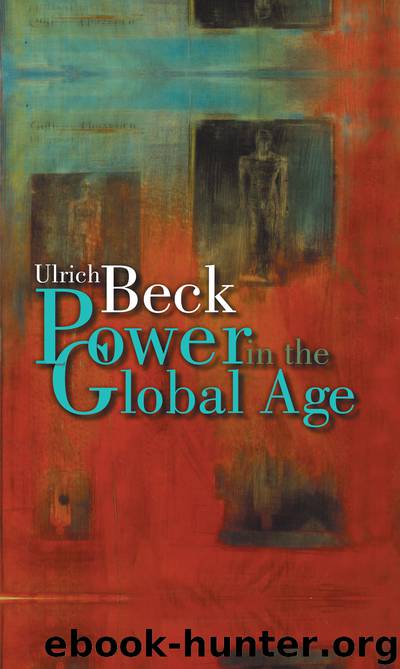Power in the Global Age by Ulrich Beck

Author:Ulrich Beck
Language: eng
Format: epub
ISBN: 9780745632308
Publisher: Wiley
Published: 2014-08-18T16:29:20+00:00
Strategies aimed at the neo-liberalization of the state
These strategies attempt to eliminate the qualitative difference and substantial contradictions between the state and the global market by changing the state into a global market state. In other words, the state is conceived of as the extended arm of the global market, as a continuation of global market politics by state political means. This is exactly what the political rather than the economic programme of neo-liberalism seeks to achieve.
What it involves, first of all, is a paradoxical acknowledgement that government, the state and politics are indispensable and irreplaceable. In their dual role as both home and host to global business actors and companies, governments play a crucial, indeed an increasingly important, role in enforcing global business interests. This is the sole reason why it is necessary to translate neo-liberal orthodoxy into neo-liberal reform politics, a politics of the neo-liberal state. Only in this way can the state change its role from tamer and opponent of global business to fellow team player.
Accordingly, the period since the 1970s has seen the development of a neo-liberal theory of politics and society based on competition between locations, one that translates the neo-liberal creed into a theory of the ‘business state’ – the ‘competition state’ – and its corresponding image of the ‘business society’ – ‘enterprise culture’. In this theory, political actors – of the state or the city – are depicted as accumulation actors. Taking the neo-liberal imperative as a given, the concept of politics is tailored and reduced to its new minimal existence as a local agent for global business policy, within which context the new coordinates of foreign and domestic policy (whose boundaries no longer apply as such), labour market and education policy, social policy, and so on, are worked through in meticulous detail. If the managers of global business were to write a wish list to Father Christmas, it would probably end up looking much like the theory of the global business-oriented competition state.
This political and state theory of anticipatory neo-liberal obedience is certainly backed up by a number of observable trends. One issue that is becoming increasingly important – in terms of states' own self-interest, of course – is how to find ways into the global market and secure a share of it. The old bilateral diplomacy between states is being progressively replaced by multilateral diplomacy, in which global market actors acquire a key role in enforcing the state's objectives. One manifestation of this trend is the emergence and proliferation of a new layer of transnational political arenas, represented by institutions such as the WTO, the OECD and the G-8 countries. It is essentially here, rather than in national arenas, public spheres or organizations, that the rules of the meta-power game of global politics are being negotiated, written and rewritten, rules which then change national politics and societies fundamentally. One indication that this is the case is that the classic fields of nation-state domestic policy – such as education, transport, energy, domestic
Download
This site does not store any files on its server. We only index and link to content provided by other sites. Please contact the content providers to delete copyright contents if any and email us, we'll remove relevant links or contents immediately.
| Elections & Political Process | Ideologies & Doctrines |
| International & World Politics | Political Science |
| Public Affairs & Policy | Specific Topics |
| United States |
The Secret History by Donna Tartt(16610)
The Social Justice Warrior Handbook by Lisa De Pasquale(11485)
Thirteen Reasons Why by Jay Asher(7782)
This Is How You Lose Her by Junot Diaz(5753)
Weapons of Math Destruction by Cathy O'Neil(5030)
Zero to One by Peter Thiel(4817)
The Myth of the Strong Leader by Archie Brown(4785)
Promise Me, Dad by Joe Biden(4440)
Stone's Rules by Roger Stone(4412)
Beartown by Fredrik Backman(4404)
How Democracies Die by Steven Levitsky & Daniel Ziblatt(4392)
The Fire Next Time by James Baldwin(4336)
100 Deadly Skills by Clint Emerson(4070)
A Higher Loyalty: Truth, Lies, and Leadership by James Comey(4025)
Rise and Kill First by Ronen Bergman(4008)
The David Icke Guide to the Global Conspiracy (and how to end it) by David Icke(3875)
The Farm by Tom Rob Smith(3869)
Secrecy World by Jake Bernstein(3773)
The Doomsday Machine by Daniel Ellsberg(3725)
